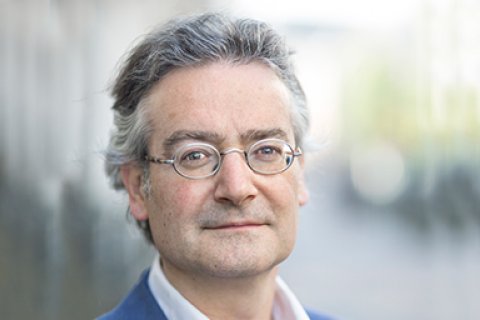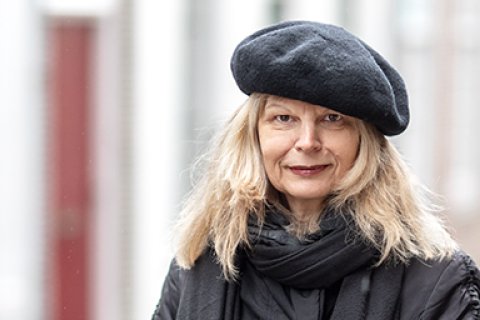200 scholars from an array of disciplines collaborated on the theme of European Open Societies

On Monday 16 September, Utrecht University’s strategic research theme ‘Institutions for Open Societies’ (IOS) organized and hosted its first annual ‘IOS Toogdag’, an international and interdisciplinary research day, centered around the theme: European Open Societies in 2030 - Challenges and Institutional Responses.
Henk Kummeling, Rector Magnificus and a former IOS researcher himself considered the importance of this field of research and the critical role of the university therein. The Rector stressed the need to collaborate with and support researchers working in more difficult societal circumstances, as well as the value of tension and contestation within academia – thus firmly opposing the idea of ‘safe spaces’ within the academic community.

Theoretical perspectives on the open society
In a clear and illuminating talk, Mark Bovens, professor of Public Administration, introduced a quartet of academic perspectives on the open society and its challenges: the philosophical, the sociocultural, the socioeconomic and the constitutional perspective. These four perspectives were later on complemented with a fifth one by José van Dijck, professor media and digital society, who convincingly argued for the need to add a technological component when researching open societies and their challenges. Whereas Bovens and Van Dijck discussed different perspectives on the concept of an open society, Arno Visser (President Algemene Rekenkamer) intervened by questioning the concept of society itself, arguing that both scholars and the public at large often approach and consider society without actually defining it clearly.
Threats

The next two speakers, Giuseppe Feola, Associate Professor of Social Change for Sustainability, and Anna Gerbrandy ,professor of Competition Law, put forward two major threats to institutions for open societies. Feola explained how ecological threats require a major and extensive societal transformation, while Gerbrandy discussed how the legal system is under threat, mostly as a result of Big Tech spilling over from the private to the public sphere.

Solutions
Bas van Bavel “the academic world is well suited to identify institutional challenges and problems, but it often hesitates to provide and organize solutions. The main point of the Toogdag was to attempt to offer possible solutions without being naïve or instrumentalistic.”
Breakout Sessions
In the varied selection of breakout sessions, many institutional challenges and responses were considered and discussed comprehensively. On a conceptual level, scholars examined the notion and key elements of openness, for instance by stressing the need for institutions to be contestable, and the role of the media therein. Others contemplated the precarious role of liberal democracy and the associated need for European policy-makers and institutions to preserve or gain legitimacy.

Next to these conceptual sessions, some key challenges for Europe and the rest of the world were explored. The role of security and its inherent tension with freedom was discussed, as well as remaining or rising inequalities.
A number of sessions focused on the future of work in light of digitalization and the increasingly uncertain role of human capital.

Naturally, the energy transition and its challenges received ample attention too. Aiming to provide concrete solutions, some gatherings presented possible avenues for improvement.
The benefits and achievements of citizen-based initiatives and social entrepreneurship were elaborated on and with TerInfo, a practical platform that raises societal resilience against terrorism in education was introduced.
Members of the Utrecht Data School were present to explain their work with big data, in addition to consulting scholars with questions concerning quantitative issues.

A practical vision
Whereas the plenary opening had been mostly theoretical, the plenary conclusion was geared towards offering a more concrete and practical vision on the present and future of open societies in Europe. The two keynote speakers, Mathieu Segers, Professor of Contemporary European History and European Integration at Maastricht University and Caroline de Gruyter, a European Affairs correspondent for the leading Dutch newspaper NRC Handelsblad and a regular contributor to Carnegie Europe, both proved to be very relevant and informative in that regard. In a stirring lecture combining academic acumen with poetic expression, Segers delved into the European history of the twentieth century to explain the contemporary state of affairs. Segers blended economic history with literary articulations to explain how the Pax Americana in postwar Europe had been nothing more than ‘a temporary fix, a flush of escapism’. Had been, because according to Segers the era of Europe looking across the Atlantic for help has ended: contemporary Europe is on its own again. Some attendees might have felt a bit uneasy by Segers’ compelling analysis, but perhaps their spirits were lifted by De Gruyter’s rather optimistic keynote speech.
inward-looking europe
De Gruyter shared Segers’ idea of a more inward-looking Europe. As a European correspondent, she had noticed a distinct shift among politicians and policy-makers during the last few years. Before, Europe stumbled from crisis to crisis, and as a result could never focus on anything but the present. De Gruyter argued that several developments altered the European political arena. The crises -such as the Greek debt crisis and the migrant crisis- might not be over, but seem less acute and heated than before. Moreover, national politicians want the European Union and the Euro to survive. As De Gruyter ably put it: Europe used to be surrounded by friends, but with Brexit, Trump, Putin and many other geopolitical changes, Europe is now challenged from all sides. This profoundly changes the European perspective and forces it to be inward-looking. These external developments might seem threatening, but De Gruyter views them as possible blessings in disguise, for they force Europeans to collaborate and think about their joint future.
New European Europe
After these two impressive keynote speeches, there was still ample time for a final discussion. Following the notion of a new, inward-looking Europe, many attendees where interested in laying bare the identity of this ‘new European Europe’. Van Bavel asked the keynote speakers where a European identity would take shape, considering the relative absence of a European public sphere. Segers acknowledged that it was still up to national media and parliaments to forge a European identity and thus legitimize Europe. In an elaborate analysis, he called attention to two paradoxical (and problematic) elements of the European Union. Whereas possibly the primary raison d’être of Europe is being anti-totalitarian, many citizens perceive it to be just that. Moreover, the ideals and values that instigated European cooperation often contradict the contemporary technocratic reality of the Union. Again, De Gruyter showed optimism concerning this last contradiction, using examples to demonstrate that members of the European parliament increasingly act on the basis of their values and ideals. For instance, the vast majority of the European People’s Party politicians voted against Viktor Orbán’s Fidesz party for breaching core European values, even though it weakened their own party from a technocratic point of view.
open european societies

Liesbeth van de Grift, Associate Professor in the History of International Relations, then asked what Segers called ‘the million-dollar question’. Since European values are clearly important, how do we reconcile these with the regional diverse values across Europe? Segers maintained that the nature of the European constitution needed to be focused on a few core principles and be a supplement to rather than a substitute for national law. With this soft-law approach and patience, European integration might fare better, according to Segers. Searching for the right direction to produce or maintain open European societies in 2030, scholars, policy-makers and everyone else involved thus need to find the right balance of incorporating core European values and principles while allowing for a degree of national and regional diversity. A difficult challenge, but in light of the abundant and ambitious desire and will to further the openness of societies shown by the diverse group of this first Toogdag participants, a challenge that will definitely be taken up.
Institutions for Open Societies
Institutions for Open Societies (IOS) is one of the four interdisciplinary research areas of Utrecht University. IOS research focuses on the development and growth of healthy open societies everywhere.

